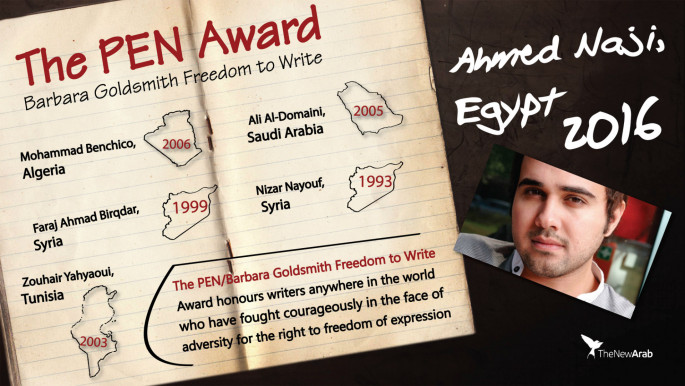Nobel laureate Naguib Mahfouz 'should have faced trial'
An Egyptian MP has stirred controversy after saying that late Nobel Literature Prize laureate Naguib Mahfouz should have been put on trial for violating public morals, amid discussions to amend a law related to publishing crimes.
Abul Maaty Mostafa is one of a 21-MP majority who voted down a proposal on Monday to amend Article 178 in the Egyptian Penal Code that punishes anyone who produces or publishes material violating public morals with up to two years in prison.
Arguing that Article 178 was unconstitutional, as it restricts freedom of expression, supporters of the amendment – only six MPs – wanted to limit the punishment to a fine between 5,000 and 50,000 Egyptian Pounds ($277 to $2,778).
Nadia Henry and Ahmed Said, the MPs behind the proposed amendment, had also recommended that citizens not be allowed to pursue legal action against others they accuse of violating public decency, leaving it instead to prosecutors to initiate legal proceedings in such cases.
Although the parliamentary committee rejected the abolishing of jail terms, it agreed that only the prosecution should be allowed to initiate legal procedures in these cases.
When confronted by Said that Mahfouz's works, such as the Cairo Trilogy, contained bold themes, Mostafa said that the late author "should have been punished, but no one filed a lawsuit against him at the time".
The Egyptian Creativity Front, a coalition comprising of the country's three main artistic unions, slammed Mostafa's remarks, accusing him of seeking fame and attention.
The coalition, which aims to fight against pressure from Islamists to limit freedom of expression, urged in a statement published on its Facebook page the Egyptian authorities to produce a national charter that would "protect heritage and freedom of creativity".
Mahfouz, who won the Nobel Prize in Literature in 1988, survived an assassination attempt in October 1994, when a radical Islamist stabbed him in the neck as he sat in his car.
He had a slow and difficult recovery and suffered the effects until his death in 2006 aged 94.
"Through works rich in nuance – now clear-sightedly realistic, now evocatively ambiguous – [Mahfouz] has formed an Arabian narrative art that applies to all mankind," the awarding academy described the author.
Ahmed Naji
The campaign to amend the law was launched earlier this year after a court sentenced novelist Ahmed Naji to two years in prison for "destroying social values" after publishing "sexually explicit content" in a literary magazine.
In 2014, state-owned newspaper Akhbar al-Adab released an excerpt from Naji’s novel Using Life that contained explicit sex acts and references to habitual drug use.
His trial came after a reader filed a complaint claiming that the indecency of the text in question caused his "heartbeat to fluctuate, along with a sharp drop in blood pressure".
He was acquitted in January but the prosecution appealed the verdict and he was sentenced in a retrial. In August, a Cairo court rejected Naji's request to suspend his prison sentence.
Naji was honoured by PEN, a literary society and human rights organisation comprising thousands of writers, editors and translators, at its annual gala in Manhattan last May.
 |
When confronted by Said that Mahfouz's works, such as the Cairo Trilogy, contained bold themes, Mostafa said that the late author 'should have been punished, but no one filed a lawsuit against him at the time' |  |
"Naji's case is emblematic of Egypt's escalating crackdown on artistic freedom in flagrant disregard for its own constitutional protections and at the expense of the country's rich cultural traditions," PEN America Executive Director Suzanne Nossel told The Associated Press in April.
"PEN hopes that this award will spur writers, readers, advocates, and world leaders to press Egypt to release Naji immediately and to stop treating creativity as a crime."
In solidarity with the imprisoned writer, many websites have re-published his excerpt, including an English translation by Ben Koerber on ArabLit, a leading blog on Arabic literature in translation.
The verdict was also condemned by fellow writers and journalists, as well as readers, scholars and human rights advocates from Egypt and other countries.
They declared their support and demanded his immediate release, stating that his prison sentence was unconstitutional.
"The continuation of such policies will further block the relation between intellectuals and the authorities," the Egyptian Initiative for Personal Rights said in a statement at the time.
 |
| [Click to enlarge] |
![Naguib Mahfouz [Corbis] Naguib Mahfouz [Corbis]](/sites/default/files/styles/image_345x195/public/media/images/05830B0F-6251-4F8E-BCA7-9A7BFD319685.jpg?h=d1cb525d&itok=uxs0Wxzp)




 Follow the Middle East's top stories in English at The New Arab on Google News
Follow the Middle East's top stories in English at The New Arab on Google News


